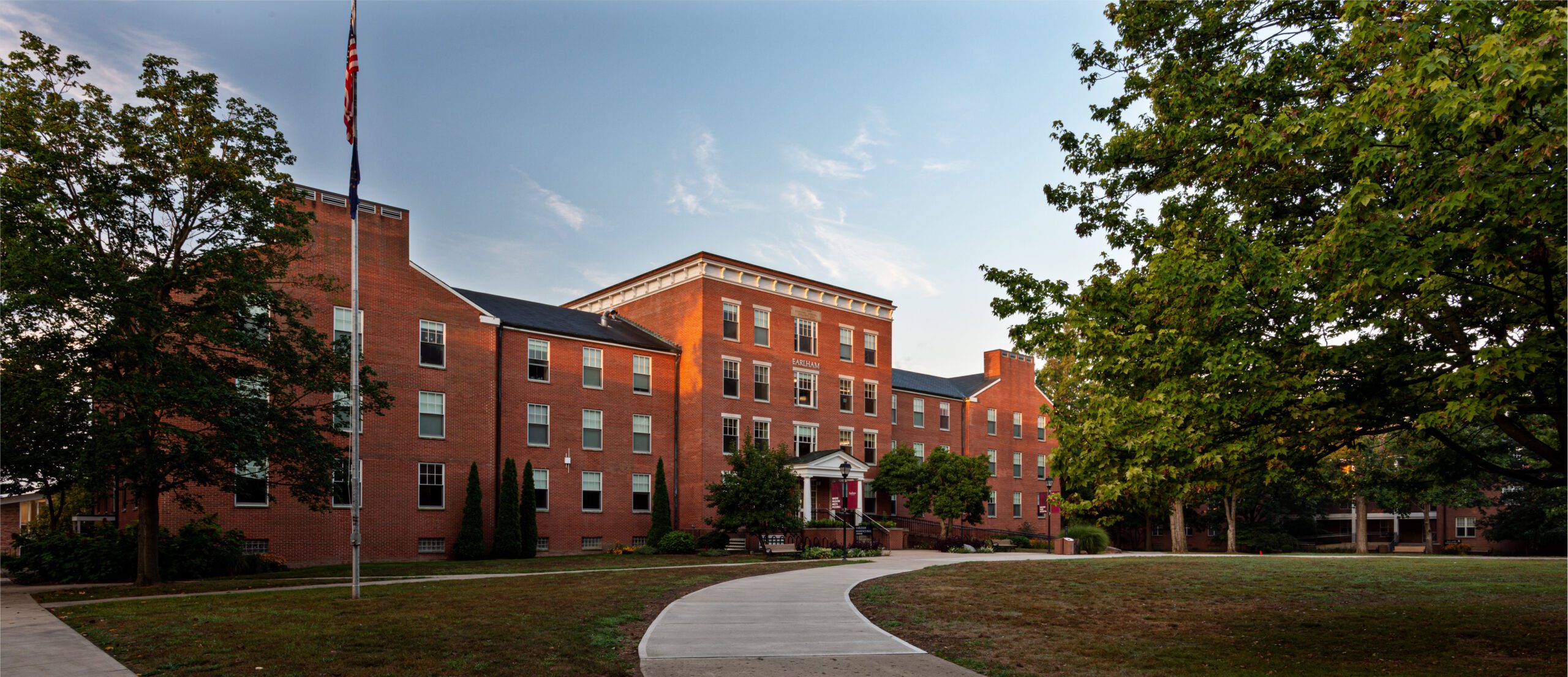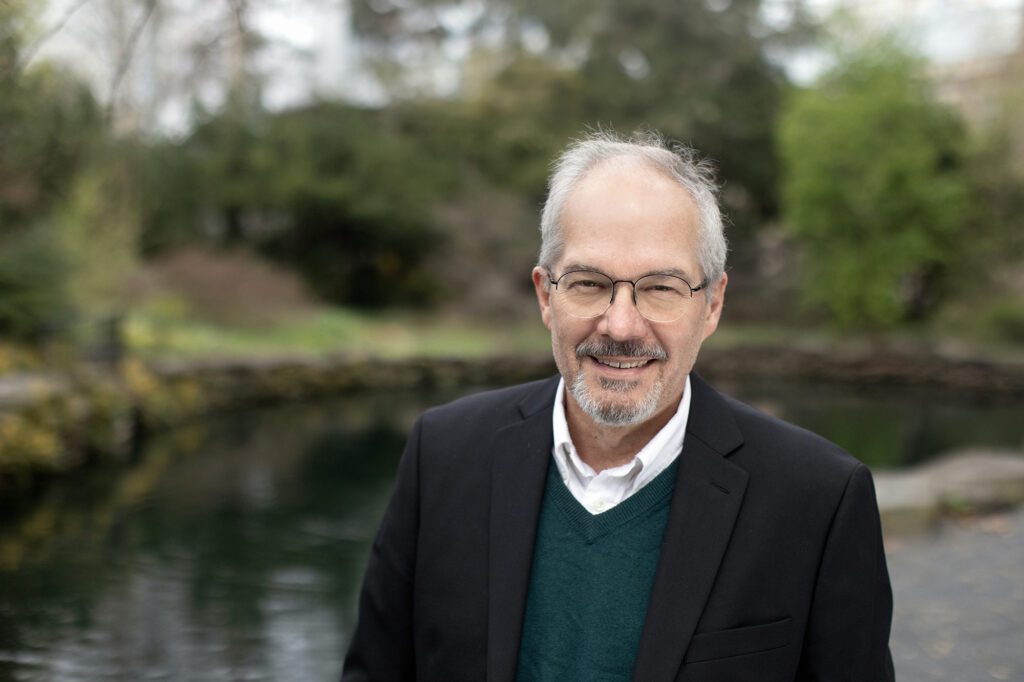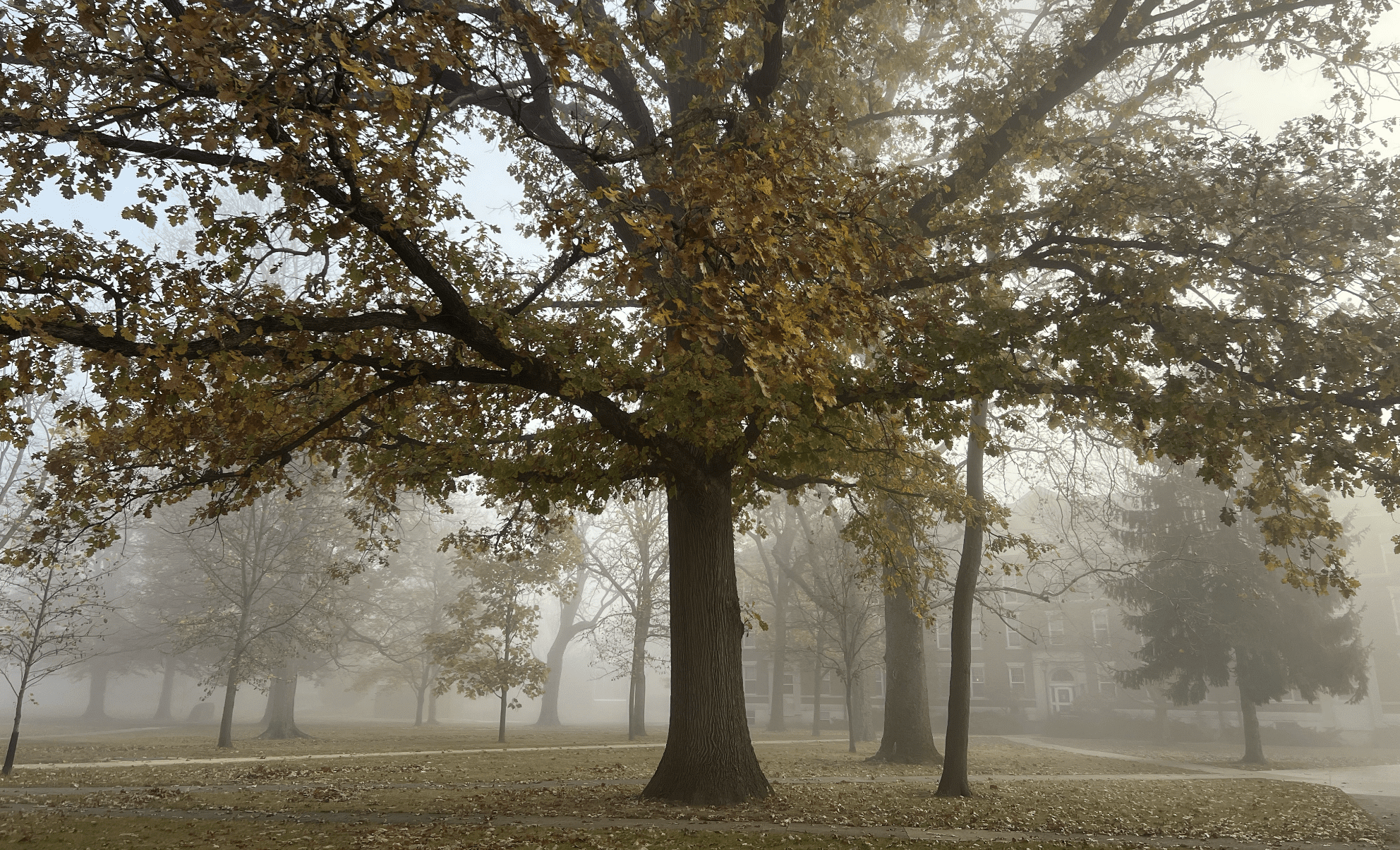
Paul Sniegowski Ph.D. named Earlham’s 21st president

Paul Sniegowski Ph.D., a distinguished biologist and the Stephen A. Levin Family Dean of the College of Arts and Sciences at the University of Pennsylvania, will become the 21st president of Earlham College and Earlham School of Religion on Aug. 1.
His appointment was announced via media release to the campus community on Wednesday, April 10, 2024.
He succeeds Anne M. Houtman, D.Phil., who will retire in July after a successful five-year term as president.
As the Stephen A. Levin Family Dean of the College of Arts and Sciences at the University of Pennsylvania since 2017, Paul Sniegowski has been responsible for the direction of Penn’s liberal arts undergraduate curricula, programs and students in academic departments and interdisciplinary programs across the humanities, social sciences, and natural sciences. Sniegowski worked closely with faculty and students in the College and across the University in adapting the College’s teaching during the COVID-19 pandemic, establishing consultative faculty committees to plan for online teaching and steering the College’s return to in-person instruction after the pandemic. Under his leadership, the College launched new minors in Environmental Humanities and Data Science and has initiated a review of its longstanding General Education requirement.
Presidential Profile
Earlham College invites confidential inquiries, nominations, and applications for the position of President.
Earlham College currently boasts a diverse student enrollment of nearly 700 undergraduate students hailing from 42 states and 49 countries, and is distinguished in the quality of its students, staff, and faculty. Earlham is a Phi Beta Kappa institution, a Peace Corps Prep college, and one of the 40 Colleges That Change Lives. Since 1847, Earlham College has fostered a collaborative learning community that inspires and motivates students with transformative opportunities and experiences—so they can become catalysts for good in a changing world. Earlham is also home to the Earlham School of Religion, a graduate seminary rooted in the Quaker tradition of contemplation that inspires action and prepares theologically diverse students for a pluralistic world.
Succeeding President Anne Houtman, who will complete a successful five-year term as president in July 2024, Earlham’s next president will be the college’s chief executive officer and will hold ultimate responsibility for all educational and managerial affairs. At a time of great challenge and opportunity in American higher education and society, Earlham stands poised to play a leading role, and the next president will guide the college and ESR to new prominence and strength. Supported by a talented and dedicated leadership team, the president will build on Earlham’s historic excellence in the classroom and strengths in international and experiential education. Working with local, national, and international partners, the president will also develop new pathways and opportunities for Earlham students to secure meaningful, productive lives and to make the world a better place.
Earlham was founded in 1847 by Indiana Quakers to foster education rooted in respect, integrity, peace, simplicity, and community. Today, the college still embodies those qualities and has consistently ranked among the top national liberal arts institutions in the country.
Located in Richmond, Indiana, Earlham’s beautiful, well-maintained 800-acre campus includes the undergraduate College and the Earlham School of Religion (ESR).Nearly 600 of its acres feature woods, streams, ponds, old fields, and prairie used for scientific research and recreation. At $425 million, Earlham possesses one of the highest endowments per student in the country. In recent years, Earlham has expanded, renovated, and constructed major campus buildings – academic, residence halls and athletic facilities – representing an investment of significantly more than $70 million. Earlham’s current plans feature still more campus improvements to attract and accommodate substantial enrollment growth over the next few years.
Sustainability is a key value at Earlham, and the College is engaged in multiple efforts to balance the environmental, economic, and social impacts of campus operations. From recycling to energy conservation to intentional investment choices, these efforts reflect collaboration among many different offices on campus to achieve Earlham’s sustainability goals. Earlham’s sustainability efforts are recognized with a silver rating by the international Sustainability Tracking, Assessment & Rating System (STARS).
Earlham is accredited, since 1913, by the Higher Learning Commission (HLC) of the North Central Association of Colleges and Schools. In 2014, Earlham received a full 10-year renewal of its accreditation, and Earlham is currently preparing for HLC reaccreditation in 2024.
Mission
The mission of Earlham College is to provide the highest quality undergraduate education in the liberal arts, including the sciences, shaped by the distinctive perspectives of the Religious Society of Friends (Quakers).
Vision
Earlham is committed to a vision that promotes the centrality of teaching and learning. It intends to create an environment where innovative approaches to teaching and learning are developed and implemented.
Strategic Priorities
In this rapidly changing time, Earlham is operating under the following broad strategic goals that are incorporated in a Board-approved Financial Sustainability and Enrollment Growth Plan. Each area of campus is pursuing strategic initiatives in alignment with these goals.
- Recruit and retain a welcoming, diverse and inclusive community of faculty, staff and students. Increase total enrollment to 1567 students by the 2029-30 academic year.
- Ensure a financially secure future for Earlham.
- Improve student success and further enhance the student experience.
- Establish strong and enduring relationships among students, faculty, and staff on campus and with engaged, supportive partners off campus.
- Support ESR in expanding its impact through increased enrollment and sustainable financial practices.
- Achieve operational excellence through continuous improvement and assessment.
Accolades
Earlham consistently ranks among U.S. News and World Report’s top national liberal arts institutions, and the College has one of the nation’s best classroom experiences, according to The Princeton Review. Beyond these rankings, many prestigious organizations — including the Rhodes Foundation, Fulbright U.S. Student Program, the Watson Foundation, and the Lilly Foundation — invest in Earlham’s students, academic programs, and facilities.
- Earlham is one of the select 40 Colleges That Change Lives.
- U.S. News & World Report ranks Earlham 36th for “Best Undergraduate Teaching” and 24th for “Best Value” among the nation’s top liberal arts colleges.
- The Princeton Review ranks Earlham 14th for “Best Private Schools for Making an Impact” and 7th for “Best Classroom Experience” among all liberal arts colleges.
- Earlham has produced two Rhodes Scholars in the last four years, including the first students to be selected for the scholarship from Afghanistan and Palestine.
- Through the Epic Advantage, Earlham is one of the few institutions in the country to offer a funded internship, research experience, or project to every student before graduation.
- Earlham is a national leader in the percentage of students who earn advanced degrees, including the Ph.D., and is ranked in the 98th percentile among 1,533 institutions in the percentage of graduates who go on to receive a Ph.D.
Located in Wayne County in eastern Indiana, Richmond is home to a population of 35,000. Richmond has been named the top small city in Indiana by the Cities Journal and has a rich heritage of music, culture, and architecture. Earlham College and the community enjoy a strong, mutually beneficial connection, with students participating in many local internships and service opportunities. Earlham’s day-to-day operations contribute more than $50 million toward the local economy each year. With nearly 400 employees, Earlham is one of the top 10 employers in Wayne County; Earlham employees are deeply involved in the community and often serve on the boards of local organizations and nonprofits.
Residents of Richmond and Wayne County enjoy a high quality of life. The area is home to excellent schools, deep history, a multitude of outdoor recreation opportunities, a year-round farmers’ market, and a range of dining options from intimate bistros and quaint cafes to upscale restaurants and family-friendly eateries. Richmond is an easy drive to Indianapolis, Dayton, and Cincinnati.
Earlham provides its undergraduate students with more than 40 areas of study, a 3+1 education program that results in a Master of Arts in Teaching, a Master of Education program and several graduate degrees at the Earlham School of Religion. In addition to these programs, Earlham also offers applied minors for students seeking to integrate their academics with other experiences, and pre-professional programs in pre-engineering, pre-law and pre-health. Applied minors are distinctive programs based around a theme and allow students to make direct connections between academic interests and co-curricular activities. Each applied minor creates a space for students to integrate 4-6 academic courses, co-curricular work such as service or athletics, and a final project appropriate to the content. Through these programs, students become active, involved learners. In the last 10 years, Earlhamites have won 26 Fulbright awards, 13 Watson Fellowships, and two Rhodes Scholarships—some of the most prestigious awards available for international study and travel. More than 60 percent of Earlham students spend a semester or more studying abroad before graduation.
In accordance with its mission, the teaching-learning process at Earlham is shaped by a view of education as a process of awakening the “teacher within,” so that its students become lifelong learners. Students and faculty are encouraged to interact with each other as persons and to learn from each other in a cooperative community – particularly through collaborative student/faculty research, leading eighty-five percent of faculty to collaborate with students in their research. At Earlham College, this education is carried on with a global concern for improving human society by educating the leaders and change agents of the future. Therefore, Earlham stresses global education, peaceful resolution of conflict, equality of persons, and high ethical standards of personal conduct.
This mission-driven pedagogy requires selection of an outstanding and caring faculty committed to creating an open, cooperative learning environment, and the College provides for the continuous support and development of this faculty. With approximately 110 full-time and 11 part-time faculty, the College has a student-faculty ratio of 6:1 and an average class size of 12. Ninety-four percent of faculty have terminal degrees in their fields.
Earlham’s signature academic and co-curricular program, the Epic Journey, is designed to help students connect their academic and personal passions with their professional and life goals. Combining a multi-disciplinary approach to addressing world problems, Epic is a four-year journey through the liberal arts that integrates excellent classroom experiences with transformative learning experiences, including research, study abroad, internships, and leadership development. This four-year scaffolded program is supported by six centers including the Center for Entrepreneurship and Innovation, the Center for Environmental Leadership, the Center for Social Justice, the Center for Global Health, the Center for Global Education, and the Center for Career Education. The Epic Advantage guarantees that every Earlham student has the opportunity to participate in at least one funded, significant career-discerning experience, such as an internship or student-faculty research experience.
Earlham’s success in integrative and collaborative education is evident through student award-winning work and scholarly opportunities, including the following: Earlham students won the Hult Prize, the world’s largest student competition for social good, resulting in a $1 million award in start-up capital for their Magic Bus project; currently, Earlham students are working with an Indianapolis nonprofit to address Indiana’s soaring infant and maternal mortality rates; a group of students recently placed third in the national Up to Us campaign competition, which builds awareness and activism around the U.S. national debt.
Earlham graduates have made a positive difference in their fields and the larger world. Among Earlham’s notable alumni are Margaret Hamilton ’58, a computer scientist who helped create the on-board flight software for NASA’s Apollo and Skylab missions and the Space Shuttle and who received the Presidential Medal of Freedom, the highest civilian honor in the United States; Michael C. Hall ’93, who won a Screen Actors Guild Award and a Golden Globe Award for his role in Dexter; Wendell Meredith Stanley ’26, a biochemist, virologist, and Nobel laureate; and Zitkála-Šá, who attended Earlham in the late 1890s and whose books were among the first works to bring traditional Native American stories to a widespread white English-speaking readership.
Earlham’s next president will lead a campus community deeply committed to the college’s inspiring history, mission, and future. For 176 years, Earlham has educated exceptional students from around the globe, prepared them for lives of achievement and service, and helped and encouraged them to make a better world.
Committed to providing an education of the highest quality in the liberal arts and sciences, Earlham understands that this demands innovative approaches to teaching and learning in today’s world. The next president will lead and expand a campus culture of productive innovation that will attract students, institutional partners, and broad support. Earlham is currently concluding the largest campaign in college history – which will surpass its $85 million campaign goal next year – and the next president will be able to build on this success and develop still greater philanthropic support.
Last year Earlham’s Board of Trustees approved a well-developed Financial Sustainability and Enrollment Growth Plan designed to expand enrollment, year by year, to approximately 1567 by the 2029-30 academic year. The Board dedicated substantial resources to the Plan’s implementation, and initial returns are very promising: Earlham’s first-year class this fall of 225 students is 22% larger than its 2022 counterpart. With strong leadership from the next president and ongoing dedication from Earlham’s faculty and staff, the college will implement strategic new academic and athletic programs that will maintain enrollment growth. In this respect, once again, initial returns are clearly positive: a new engineering major and varsity softball program are already attracting student cohorts that previously overlooked Earlham.
Building on this progress, Earlham seeks a president who will work collaboratively with its faculty, cabinet, and Board of Trustees to fuel momentum on the Financial Sustainability and Enrollment Growth Plan and deftly navigate the rapidly changing landscape of higher education. The next president must greatly value of a strong liberal arts education and be able to articulate how programs such as the Epic Journey prepare students to thrive in their lives and careers after Earlham. Knowing that enrollment growth and stability will secure a strong and financially sustainable future for Earlham, the next president must have a deep understanding of best practices in these areas and a willingness to embrace innovative approaches to recruitment and retention. She or he must possess in-depth financial knowledge and excel in fiscal and operational leadership and management.
Given Earlham’s commitment to shared governance and its distinctively collaborative and consultative approach to decision making, the next president must be a person of integrity, resilience and character who can earn the trust and respect of the community. She or he must be an outstanding communicator, relationship-builder and fundraiser. Successful administrative leadership experience in higher education would be valuable. She or he must possess the ability to lead and work effectively with a strong leadership team to build strategy and ensure implementation of shared institutional goals. As one of the nation’s most diverse small colleges, Earlham’s commitment is outlined in the College’s Diversity Aspiration Statement, and the next president should have a demonstrated record of supporting and affirming diversity, equity and inclusion efforts. An understanding of and respect for Earlham’s mission and Quaker values, including consensus processes and shared governance, is important. A terminal degree is preferred but not required.
Applications should consist of a substantial letter of interest, a curriculum vitae, a statement describing interest in and experience with matters of DEI, specifically as they relate to the position, and a list of five professional references with full contact information. No references will be contacted without the explicit permission of the candidate. Applications, nominations, and expressions of interest can be submitted electronically, and in confidence, to: [email protected]
The position is open until filled but only applications received by Wednesday, January 31, 2024, can be assured full consideration. The college is being assisted by Academic Search. Confidential discussions about this opportunity may be arranged by contacting consultants Ann Hasselmo at [email protected], Steve Schutt at [email protected], and Chris Butler at [email protected]. Further information about Earlham College is available at https://earlham.edu/.
Earlham College is an equal opportunity employer committed to building a diverse community, one that reflects the makeup of society at large and that particularly welcomes and supports individuals from groups that have been historically marginalized because of factors such as race, ethnicity, sex, gender identity, gender expression, sexual orientation, socioeconomic class, and physical ability. The College strongly encourages applications from women and people of color. As an institution with a Quaker identity, the College also solicits applications from members of the Religious Society of Friends (Quakers).
- Zachariah Andre ’24, Earlham College student
- Peter Blair, Earlham College teaching faculty
- Tania Deng ’87, trustee
- Rodolfo Guzman, Earlham College teaching faculty
- Diana Hadley, trustee
- Martha Hill ’79, alumni representative (and trustee)
- Adam Hutchinson, Earlham College administrative faculty
- Janica Kyriacopoulos ’81, trustee
- Fred McClure ’84, ex officio as Board of Trustees vice chair
- Jim Montoya, trustee, search committee co-chair
- Alan Scantland ’74, trustee
- Drew Smith ’86, trustee, search committee co-chair
- Lyn Thomas, Earlham College staff representative
- Tom Thornburg ’84, ex officio as Board of Trustees chair
- O’Jeanique Twyman, Earlham College administrative faculty
- Colleen Wessell-McCoy, Earlham School of Religion (ESR) representative, ESR teaching faculty
